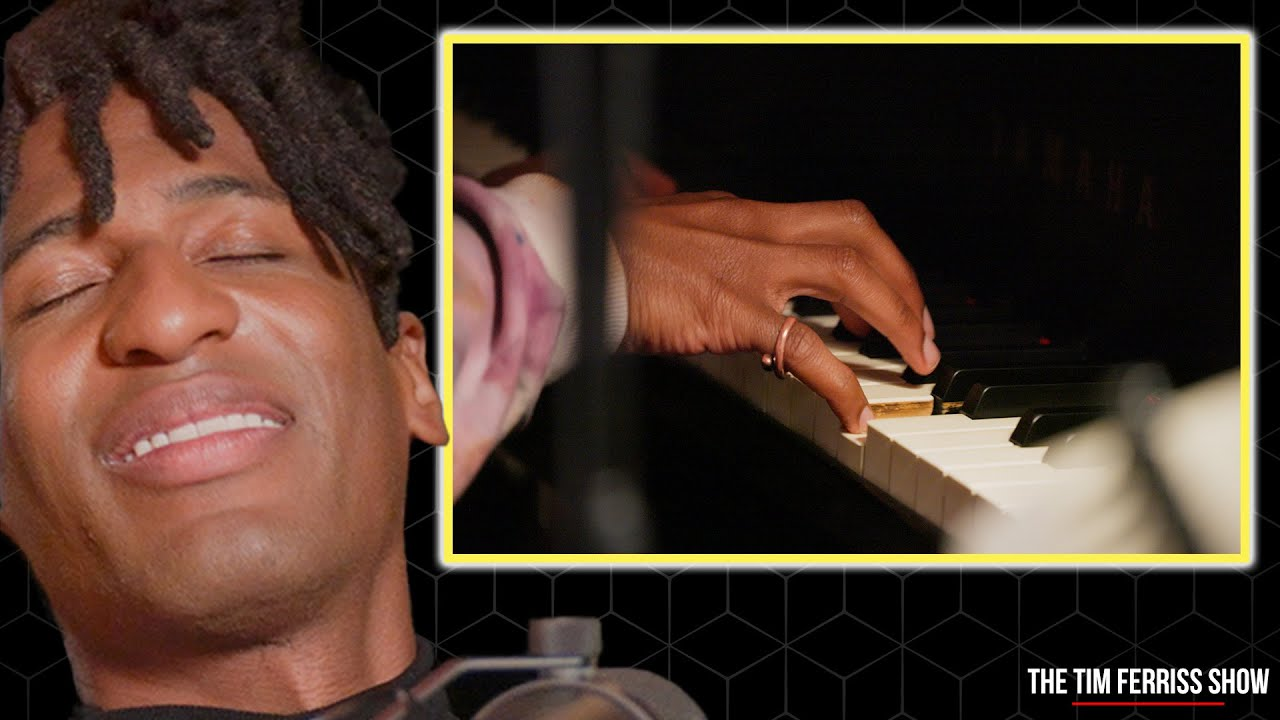The video uncovers a unique and inspiring concept where Beethoven's music is not just played but expanded through a conversation-like approach. This creative exploration involves reimagining Beethoven's works by incorporating diverse musical elements such as flamenco, gospel, jazz, and blues which were born after Beethoven's time. This synthesis represents a blend of human expression and spirituality, striving to transform classical music by infusing it with modern and cross-cultural influences.
The significance of blues in this transformation is highlighted by its role as an allegory for the human condition, featuring characteristic moans, cries, and inflections. The blues, with its rich cultural and spiritual roots, becomes an inclusive framework that transcends its musical form. It involves emotional expression and a communal experience across diverse domains, symbolizing a democratic form of musical and social interaction. Furthermore, it exemplifies the simplicity and complexity of human emotions, making it a profound artistic endeavor.
Main takeaways from the video:
Please remember to turn on the CC button to view the subtitles.
Key Vocabularies and Common Phrases:
1. allegory [ˈælɪˌɡɔːri] - (noun) - A symbolic narrative in which the surface details imply a secondary meaning. - Synonyms: (parable, metaphor, symbolism)
And the blues is an allegory for the human condition in sound.
2. inflection [ɪnˈflɛkʃən] - (noun) - The modulation of intonation or pitch in the voice. - Synonyms: (intonation, pitch, modulation)
It's a sound, it's a style, it's an inflection.
3. diasporic [daɪˈæspərɪk] - (adjective) - Relating to the dispersion of people from their original homeland. - Synonyms: (dispersion, migration, scattering)
...the range of cultural diasporic reality that has existed since.
4. pentatonic [ˌpɛntəˈtɒnɪk] - (adjective) - Relating to or consisting of five notes. - Synonyms: (five-note scale, melodic, musical)
That's the pentatonic scale. That's the sound of the blues.
5. symmetry [ˈsɪmɪtri] - (noun) - Balanced proportions or equal arrangement. - Synonyms: (balance, harmony, proportion)
That in and of itself has a perfect symmetry.
6. ubiquitous [juːˈbɪkwɪtəs] - (adjective) - Present, appearing, or found everywhere. - Synonyms: (omnipresent, pervasive, universal)
...before, even really understanding that is so ubiquitous.
7. undergirding [ˌʌndərˈɡɜːrdɪŋ] - (verb) - To provide support or a basis for something. - Synonyms: (support, bolster, fortify)
...the basic undergirding sort of eye beams of the architecture.
8. elemental [ˌɛlɪˈmɛntl] - (adjective) - Basic and powerful in nature. - Synonyms: (fundamental, basic, primary)
And it's also something very elemental that can be wielded.
9. intermingling [ˌɪntərˈmɪŋɡəlɪŋ] - (verb) - Mixing or mingling different entities together. - Synonyms: (blending, mixing, combining)
...you've sort of brought these flows back together in a way that they can intermingle.
10. catharsis [kəˈθɑːrsɪs] - (noun) - The process of releasing, and thereby providing relief from, strong or repressed emotions. - Synonyms: (release, purification, cleansing)
That feels like taking the hypotenuse to catharsis.
The Musical Genius of Jon Batiste
The idea is something that I feel uniquely positioned to do is hearing Beethoven's music and not just playing it as it says, you know, on the score, but being in conversation with Beethoven and extending his music. So as we talked about, you know, this idea of streams, this sort of spontaneous composition, if you were to take Beethoven's music and exist within the music as if you were co composing it with him and adding all these elements that many of which, all of which existed after his time on earth. So you have things like flamenco music or gospel music, so jazz music and blues primarily, which to me is the not just musical innovation of the 20th century, but an innovation of human expression and spirituality.
Could you say a little bit more about that? Because I listen to blues. Yes, but I want to understand why you feel that way about it. And it's not that I disagree, but I want to understand the magnitude of what you're saying. Yes, yes. Blues is a form of music. It's also a form. It's a 12 bar form. It's a sound, it's a style, it's an inflection. You can sound like the blues without playing the blues. If you moan or you cry, the instrument wails. That idea is something that is about our existence in the human condition. And the blues is an allegory for the human condition in sound. It's a musical allegory that exists within the context of a cultural movement. So that's something that has not happened and has existed before it had a name. So for you to find things like that in the world that are foundational to our existence, and then to figure out how do I name them and identify them so then they can be shared.
And then furthermore, how do you create a whole system that not only becomes its own form of musical engagement, sociocultural engagement, their dances, their blues rituals, juke joints, stomps, boogie woogie, all this that we've grown accustomed to now I can also implement that into other spaces of music which becomes this democratic expression of humanity. So what I started to think about with the blues is there are forms of music that express that aspect of the human condition and that pathos, that pathos, but didn't have all of the language that we have to acutely express it and also include the range of cultural diasporic reality that has existed since. So now we can take that and inject these other forms of music, these other expressions with something that's so profound and so deep and so rooted, so human. It's an opportunity, it's an amazing. It's opportunity of a lifetime for an artist. And the blues provides that.
Now, the one other thing in the technical realm, the blues is simple and it's complex. The blues is generally three chords, but you don't always have to be playing those three chords to be playing the blues. It's spiritual, but it's also very much scientific. So if you take these five notes, that's the pentatonic scale. That's the sound of the blues. The pentatonic scale, though in this form, has existed in music since the beginning. Gregorian chants, indigenous folk music, music of drum circles in West Africa, in Ghana, all the different sounds of Appalachia. Eastern music. You've heard this sound. You hear this sound in every culture since the beginning. Now, if you add. If you add that note, that's what we call the blues scale. The blues is in the sound of the pentatonic scale. That in and of itself has a perfect symmetry.
The blue note is the expression that our early ancestors in this country created to add the sense of the American experience to this scale, to this. It's not just more than. It's more than the scale. They added this to exemplify the specificity of America and the experience of American life in all different ways. You can play the blues even without playing the scale. Because the thing about the blues inflection is that if you can capture that blues inflection, you can find melodies that have the blues, you can find voices that have the blues, you can find rhythms that have the blues. Mainly the shuffle rhythm, which is something that came from Africa and is the marriage of six, eight over two, a two beat and a three beat combined at the same time. And that evolved into the American shuffle rhythm.
So all of these things are so interconnected and so sophisticated, so intricate. And the blues, after all that, you can sit on a porch or a ballroom or a juke joint, and anybody can sing it. And it's always two verses and an answer. The thrill is gone the thrill is gone away the thrill is gone the thrill is gone away Finish it for me. Oh, no, no, no. I'm just saying. Yeah, yeah. That's how simple it was codified. Yeah. The architecture, like the basic undergirding sort of eye beams of the archite. Quite simple. But the way that it can be applied is just beyond counting. Right. It's the thing that existed in the air and the thing that we've all felt within. And it took this American experiment for it to emerge into a form.
Yeah, that makes sense. It makes sense. I mean, it's a combination of discovering fire, this thing that has always been there, that we now have a form for. Right. And it's also something very elemental that can be wielded in a million different ways. And as you have different cultural influences, you have different combinations of people, newer and newer and newer ways of applying it emerge. We've heard it in rock and roll bass lines our whole life. The old, you know, just thinking about all of the ways that I've heard the blues before, even really understanding that is so ubiquitous. You know what I mean? I'm thinking we here in Jimi Hendry's studio, that's the pentatonic scale. There's just so much that you would. You can listen to so much and understand it. So when I took Beethoven, I was thinking, you know, if you put that on it, Beethoven in the Congo. 1, 2, 3. 1, 2. 1, 2. So you know what I mean?
I do. And then you find the blues. It's a. My dad used to play that song on the piano when I was a kid. That specific segment just activated, like Ratatouille style, when Anton Ego flashes back to being a kid. Yeah, that was wild. Incredible what music does. I mean, I'm not a musician, but it's so igniting, to use that word. It's just. It's an incredible key that unlocks. These songs too, are so deeply connected to us. Beethoven wrote songs, we're listening to these compositions, these melodies, themes, all these things we've heard for years and years over generations.
So it ignites people's love, not just for music, but brings them back to moments in their life, experiences in their life. And that's what this album, this music is generally about, the concept of Beethoven blues, but also about the humanity that it will bring people together, bring somebody back to the instrument who stepped away for many years, kids who are growing up, who. Maybe I don't see myself in classical music, but now I see. Oh, there's a. I see something that was always there, like the blues can bring it out, but it just hadn't been presented to me in that way.
And I mean, what comes to mind as an image for me also is you have these various tributaries of music that have in some ways separated out. I'm not sure I'm using the right geological term here, but they've sort of separated and flowed out into different fingers. And what you seem to have done starting, maybe not starting, but certainly at Juilliard, especially afterwards, is you've sort of brought these flows back together in a way that they can intermingle, which gives people permission to remix, to make something that is uniquely theirs.
To live, baby. To live. That's it. That's it. It's not just the music. It's not about the music. It's about the music and more. Wow. He played that. I like doing this. These harmonies. Like, imagine if you. There's a version on the album that goes for 20 minutes, and it makes this into a. It's this healing trance. It's like a meditation. I'm just gonna put this album on repeat and listen to it a thousand times. Oh, man. I mean, 20 minutes of that. I mean, that feels like. That feels like taking the hypotenuse to catharsis. Yes. That's it. That's the idea. Yeah. Wow. I feel very privileged to even watch you do that.
INNOVATION, MUSIC, INSPIRATION, BLUES, BEETHOVEN, CULTURAL EXPRESSION, TIM FERRISS


